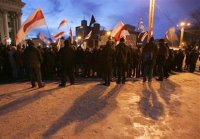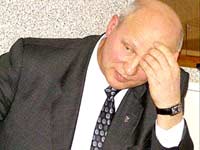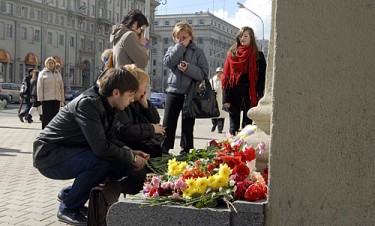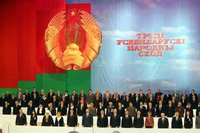 Hits, blows and kicks - the eternal language of totalitariansim - today confonts the people's inalienable right to freedom and democracy. This is Belarus - the centre of Europe - in February 2006. Here, evil old times still reign. With the grip as of an iron fist, president Aleksandr Lukashenka rules the country as a last remnant of soviethood. The outcome of the upcoming 19 March presidential elections seem predictable for the pre-ordained president in power.
Hits, blows and kicks - the eternal language of totalitariansim - today confonts the people's inalienable right to freedom and democracy. This is Belarus - the centre of Europe - in February 2006. Here, evil old times still reign. With the grip as of an iron fist, president Aleksandr Lukashenka rules the country as a last remnant of soviethood. The outcome of the upcoming 19 March presidential elections seem predictable for the pre-ordained president in power.A few days earlier, on March 15, the democratic opposition of Belarus may want to commemorate the country's first democratic constitution - that of 1994. However, few will probably dare to demonstrate for a democracy that has become defunct. This is so while, since then, Lukashenka leads a regime with increasing totalitarian expressions.
The people is denied not only democracy, but also the right to national identity. As a gesture of omnipotence, Lukashenka introduced Russian as the official language and forbade national symbols at an early stage of his presidential tenure. Oppression of national identity is one element of the nomenklatura strategy to hold on to the power and privileges of soviet times. Leading oppositionists are jailed or disappear in a country where the secret service still is called the KGB.
From democracy to dictatorship?
The road to democracy for Belarus was barred when Aleksandr Lukashenka in 1994 was elected president. Within a year, Lukashenka eliminated potential opposition from legislative power by staged parliamentary elections and a referendum that jointly gave him unrestricted powers. This was the first of a series of elections which legitimacy have come to be rejected by the Council of Europe, the OSCE and the international community in general. By power of decree and manipulated referenda, the president himself has been able to set the limits of his rule. A third presidential period was ensured in 1999 by way of changes in the constitution, and in 2004 all bars for presidential term limits were removed.
As Lukashenka now inevitably seems to be up for his third presidential term, one might ask what characterises Lukashenka's leadership? Several former associates question the mental health of the president. His demagogics express populism as well as paranoia. In the country that during WWII lost the highest percentage of its population, anti-semitism and admiration of Hitler seems awkward to say the least. Still, this has been part and parcel of presidential personality in Belarus. The international isolation of Belarus is explained by a conspiracy directed by the US and NATO. This was far from true when Lukashenka first aired such thoughts, but by provocative domestic and international behaviour, he has become l'enfant terrible of European politics. Today, western governments would cheer to see Lukashenka ousted from power. Conspiracy or no conspiracy - this is the simple fact. The veracity of Lukashenka's madness may probably be questioned. His policies may likewise be considered a shrewd calculation that he would never be able to make it, if Belarus were to become party to European integration. However, it seems clear that he suffers from a distorted sense of reality, which hardly can be explained by unrestricted power or international isolation.
Opposition
Market socialism?
The Chernobyl heritage
Moscow and Minsk
Since the 1990's, Russia and Belarus have been knit closer together by a series of union agreements. Lukashenka's ambitions to one day become leader of a resurrected union has provoked irritation as well as ridicule in Moscow. It is also quite obvious that Russian president Putin despises Lukashenka as something the cat has dragged in. Putin has also met with representatives of the Belarus' opposition in a futile attempt to explore the possibilities of an alternative to Lukashenka that would be favourable to Russia. Returning to union plans, leading Russian politicians criticised the cooperation at an early stage. Russian policy towards the "near abroad" - the former soviet republics - initially set EU economic cooperation as an example. The realisation that the soviet empire was advantageous neither to Russia nor to the republics is easily counterbalanced by Russia's strategic interest in retaining Belarus within its sphere of influence. Neither the economic burden of Russian subsidies nor the knowledge of what happens in Minsk are important as long as Moscow keeps control over Belarus' security policy. Still, it is Russia that sets the limits of Lukashenka's rule. Russian support for his authoritarian regime is both untactical strategy and unstrategic tactics. In view of the country's size and location, Belarus might have the potential to become a bridge between the economies of Russia and the EU. A future democratic Belarus is Russia's window to Europe.
The Tacit Triumph of Totalitarianism?
What do the affairs of Belarus concern us? For most, Belarus remains a far-away country of which we know nothing. Despite western efforts to turn developments in Belarus towards democracy, next to nothing has been achieved. The lack of unity towards Belarus between the US and the EU, and among EU members themselves, has made western policies erratic and ineffective. It is also likely that any solution to the "Lukashenka problem" must involve Russia, while the west itself has imposed Moscow's droit de régard on the issue of Belarus. As external support by the joint and concerted efforts of the US and the EU, as well as perhaps - unlikely as it might be - Russia, are necessary to create conditions for change, such measures are far from sufficient to overturn the Lukashenka regime. True change can only be brought about by the people of Belarus itself. As long as neither external nor internal conditions exist, Belarus will remain a black hole in the middle of Europe.
As oppression against the opposition mounts for the upcoming March 19 presidential elections, the west may - to no avail - holler in protest at the top of its voice, if this is not accompanied by a sincere will to apply the measures necessary for change. For as long as the people of Belarus cannot exercise their freedom of speech and liberty of choice, totalitarianism tacitly triumphs in the Europe of 2006.



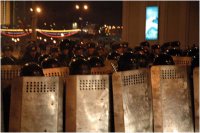
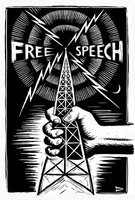





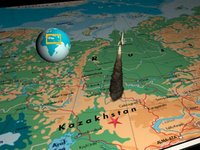
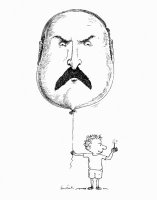
 After a press conference in Minsk this morning, Belarus opposition leader and former presidential candidate Alyaksandr Milinkevich was arrested by Belarus police. The arrest was due to an "illegal" demonstration in Minsk on Wednesday to commemorate the 20th anniversary of the Chernobyl accident.
After a press conference in Minsk this morning, Belarus opposition leader and former presidential candidate Alyaksandr Milinkevich was arrested by Belarus police. The arrest was due to an "illegal" demonstration in Minsk on Wednesday to commemorate the 20th anniversary of the Chernobyl accident.